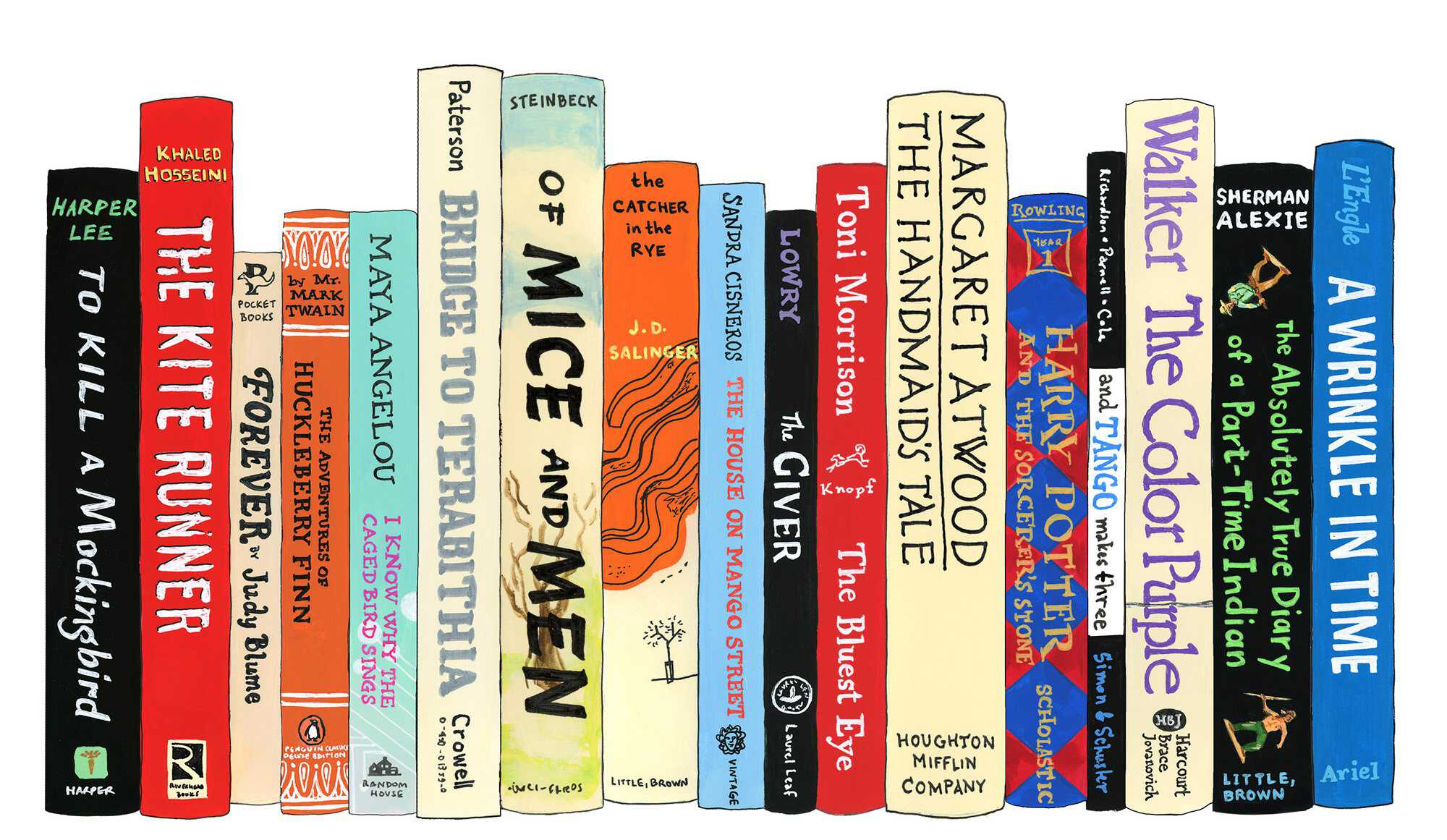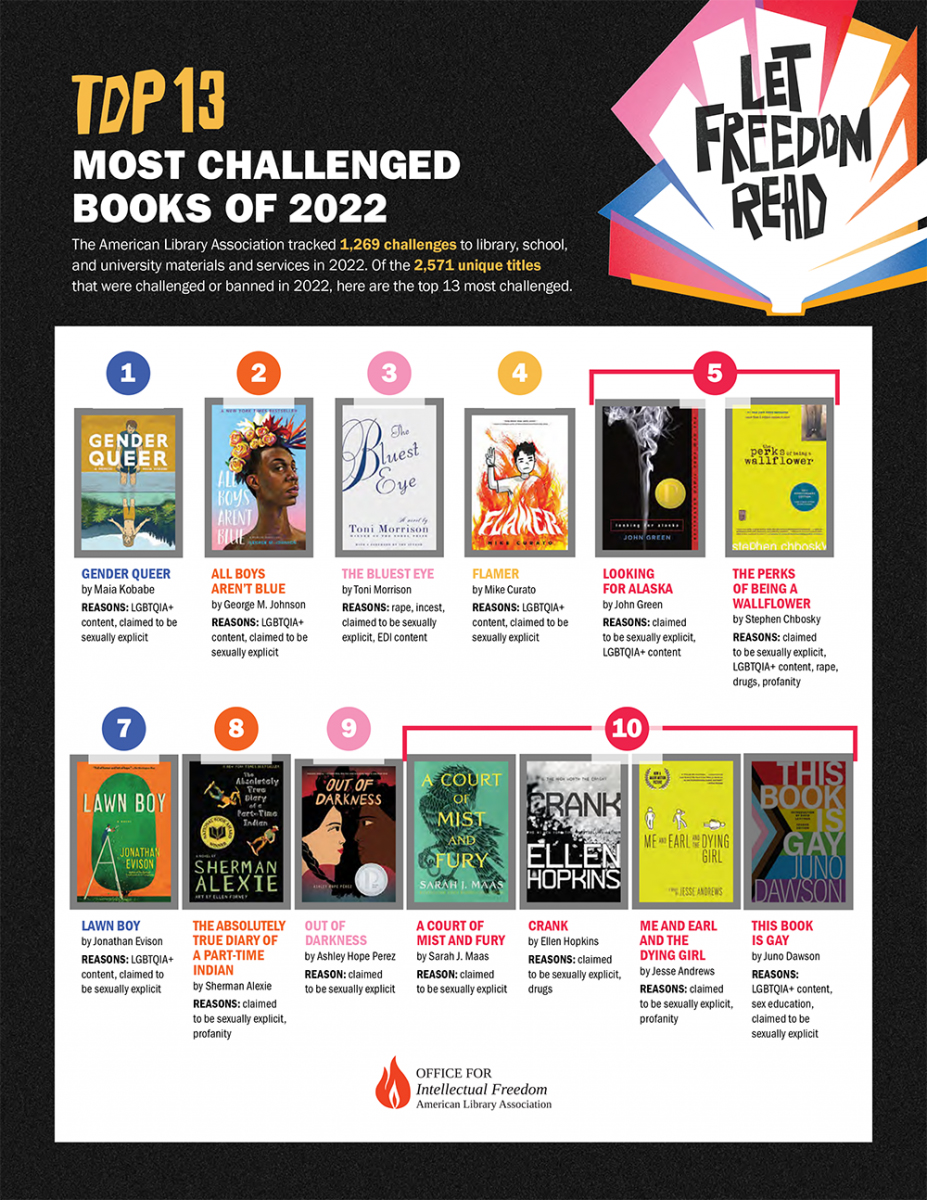Banned Books Week is October 1-7. 2023

Banned Books Week was launched in the U.S., in 1982, in response to a sudden surge in the number of challenges to books in libraries, bookstores, and schools. Typically held near the beginning of the school year, the annual event highlights the value of free and open access to information and brings together our book community: librarians, teachers, authors, publishers, and booksellers. All of these people surely like to read but even more important, they respect and cherish everyone’s right to seek out information and enjoy the expression of ideas.Please consider attending a Banned Books Week event! Here is a set of suggestions for some North County in-person events (but also some on-line events!)
A very vocal but very small group of individuals usually takes credit for banned book censorship and plenty of damage is caused. Fortunately, the American Library Association compiles an annual list of books that have been reported as challenged, using media reports and input from librarians and teachers across the country.
Nazis historically have been the more famous book-banning force, but hysterical school parent activists are good at grabbing current headlines in their efforts to subdue knowledge, too. Politicians looking for votes sometimes stoop to book-banning tactics as well.
Banned Books Week is an annual event that highlights the value of free and open access to information. The event is supported by a coalition of organizations dedicated to free expression, including American Booksellers for Free Expression, American Library Association, American Society of Journalists and Authors, Amnesty International USA, Association of University Presses, Authors Guild, Banned Books Week Sweden, Children’s Book Council, Comic Book Legal Defense Fund, Foundation for Individual Rights and Expression (FIRE), Freedom to Read Foundation, GLAAD, Index on Censorship, Little Free Library, National Book Foundation, National Coalition Against Censorship, National Council of Teachers of English, PEN America, People for the American Way Foundation, PFLAG, and Project Censored. It is also endorsed by the Center for the Book in the Library of Congress.
Please consider attending a Banned Books Week event! Here are a few.
Here is a set of suggestions for some North County in-person events (but also some on-line events!)
Two musicians who are under that very helpful Amnesty International spotlight this very year are profiled as follows:
Yahaya Sharif-Aminu is a 22-year-old singer who is detained in a prison in northern Nigeria. He is at risk of imminent execution after an Upper Shari’a Court sentenced him to death by hanging for circulating a song via WhatsApp, which is considered blasphemous. Amnesty International has set up a formal letter-writing campaign to demand Yahaya’s release. Visit the website below to learn more:

Well-known Iranian rapper and hip-hop artist Toomaj Salehi has been in detention for nearly a year in connection to his music and posts on social media denouncing the unjust practices of the Iranian government.
Amnesty International has set up a formal letter-writing campaign to demand Salehi’s release. Visit the website below to send a letter to the Iranian Supreme Leader using the Amnesty letter-writing tool: https://www.amnestyusa.org/
Within our own shores and in less life-threatening conditions, let’s end this month’s column covering some issues that school-age thespians want you to know about: the same American schools that have banned print materials have sought control well beyond books—the plays and musicals high school students mount in their official academic year have encountered the ire of noisy censors, even when the material has been cooperatively modified by licensing agencies for a school-age setting:
A Connecticut high school halted a well-underway production of the rock opera American Idiot despite assurances that a licensed, sanctioned age-appropriate version was to be presented.
Parents at a San Fernando Valley Catholic school rallied against the performance of the musical Cabaret. The school principal supported the performance as an appropriate learning experience for the students. City officials stated they would have allowed the performance to happen independently, provided outside sponsorship was secured for theater rental—but the student group, feeling threatened, surrendered to intimidators, and, just as with a previous season’s Rocky Horror Picture Show, the artists were left without a production.
An Ohio high school fired a theatre arts teacher after a production of the musical Legally Blonde. Students were permitted to finish the run of the show, but that dismissal and over-the-top criticism from school leaders marred the students’ experience.
A production of Jonathan Larson’s Rent was cancelled by the principal at a high school in Trumbull, Connecticut following complaints over content. The young actors were performing an age-appropriate adaptation intended and licensed for school performers.
A Williamsport-area school in Pennsylvania cancelled Monty Python’s Spamalot and fired a drama teacher, denying the school’s thespians a season highlight.
A high school production of Sondheim’s Sweeney Todd was cancelled after school administrators objected to the musical. In addition to losing their show, the students were also intimidated by officials from participating in a peaceful online protest.
There is one show that a school tried to ban, but things ended well:
A performance of The 25th Annual Putnam County Spelling Bee (a slightly modified student version of William Finn and Rachel Sheinken’s Tony Award-winning Broadway hit) was cancelled about a week before it was supposed to open at a Maryland middle school due to the school’s concerns about profanity, innuendo, and racial humor in the play. After the cancellation gained national attention, the school relented and allowed the performance to go on!

And so, we end this month’s Troubadour column on that happy note.

